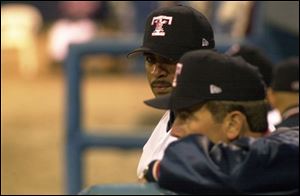
Minor leagues, major inconveniences
6/17/2001
Mud Hens manager Bruce Fields, left, and pitching coach Jeff Jones knew on the first day of the season they might get caught short of players. Sure enough, Friday night it happened.
It was a rainy Friday night in Toledo, and the Mud Hens were in danger of having a game postponed.
That would seem to be bad news for the Hens, who had won eight straight games to that point.
What's more, the Hens were facing a Richmond team that had lost four in a row and seven of its last eight.
Hens manager Bruce Fields was desperately hoping the game would be played, right?
“Well, if we got rained out I wouldn't mind,” Fields admitted before the game.
Huh?
Why would the manager of a red-hot ballclub be willing to see a game rescheduled to another day when his team might not be so hot - and the other team might not be so cold?
The answer:
Welcome to Triple-A baseball.
Fields knew the team he would send into action Friday night resembled the team that had won eight straight games, but in uniform only. Two players - outfielder Lyle Mouton and infielder Pedro Santana - were not with the team due to personal reasons.
And when the Hens' parent club, the Detroit Tigers, called up infielder Jarrod Patterson roughly an hour before Friday's game, well, Fields had a problem.
Those moves left him with only eight position players. The result was a catcher, David Lindstrom, gamely playing second base and a batting order that featured the pitcher as the No.9 hitter because there was nobody around to be the designated hitter.
That wasn't the whole reason the Hens lost to Richmond on Friday, but it certainly played a role.
Whose fault was it the Hens were caught short? “It's nobody's fault,” Fields said. “Mouton asked me three weeks ago to attend his sister's wedding. Pedro's father just so happened to become ill at this time. It's not Detroit's fault that Lyle and Pedro are gone.
“And when you're at the Triple-A level, you're here to supply players to the major league level when one of their players gets hurt. When they call, we respond.”
And when a Triple-A team is caught short it sometimes has to adapt too. That's why a number of versatile Hens - such as Lindstrom, Patterson, Kurt Bierek and Brian Rios - will play as many as three or four different positions during the season.
That's why earlier this season Fields was forced to use two position players, Rios and Giomar Guevara, as pitchers on back-to-back nights.
And that's why the Hens used a pitcher, Mike Oquist, as a DH twice last season.
Richmond manager Carlos Tosca sympathized with Fields' plight Friday night - he has used seven of his players at three different positions, with Travis Wilson having started at four different spots.
“It's unfortunate that it ever has to happen,” Tosca said of the Hens' player shortage. “I feel at the Triple-A level there is more movement than there ever has been.
“To strap a team like that is not fair.”
Both Fields and Tosca offer the same solution to the problem: raising the International League roster maximum to 25 players.
Currently the IL allows teams to carry 24 players for the first and last months of the season, and only 23 players the rest of the year.
“When you're at the Triple-A level rosters fluctuate quite often, and I believe you need to have a 25-man roster,” Fields said. “You have that at the major-league level, so why not at Triple-A? When you are expected to supply players to the majors, roster limits make for these situations.”
Until something is done to solve this problem, Triple-A teams will have to take Fields' “What, me worry?” attitude.
“I'm not going to worry about things I can't control,” he said before Friday night's game. “We'll just play the best we can and do what we can do.”